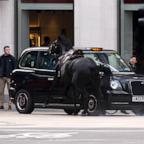Excerpt: 'Reallionaire: Nine Steps to Becoming Rich from the Inside Out'
Dec. 22, 2004 — -- Farrah Gray went from being on public assistance to becoming a millionaire by the time he was 14 years old. In "Reallionaire: Nine Steps to Becoming Rich from the Inside Out," Gray and his co-author, Fran Harris, recount the remarkable journey that began when Gray was 6 years old, and his mother became seriously ill, prompting his decision to provide for his family from then on.
Gray's business ventures have included KIDZTEL pre-paid phone cards, Farr-Out Foods, One Stop Mail Boxes & More, the Teenscope interactive teen talk show, a comedy show on the Las Vegas Strip, the NE2W Fund to support young entrepreneurs, and InnerCity magazine, a joint venture with Inner City Broadcasting, Inc.
Gray's mission is mission is to educate young people about career opportunities in business, while leading by example in the area of social responsibility. Read excerpts from "Reallionaire: Nine Steps to Becoming Rich from the Inside Out" below.
Sit up straight. Brush your teeth. Don't talk to strangers. Smile. Do unto others. The list goes on and on. Since we took our first breath people have been telling us what to do, haven't they? They meant well, but in the grand scheme of things, most of the advice people gave us growing up wasn't very useful. That's why I have a saying in my office: "Less is better -- if less is good to begin with." I don't pretend to have all the answers, but I know what I know. In business you have to dot your I's, cross your T's, admit your mistakes and say thank you if you want to get anywhere. Nobody wants to do business with someone who pays no attention to detail and isn't appreciative.
Stakeholders invest in people first and the idea second, as I've said. This premise is sometimes lost on entrepreneurs seeking seed capital. People invest in people based on their perceived worthiness. I have seen wealthy individuals walk past a homeless person hold- ing out a cup. Why? Because they felt that nobody should be given anything -- and even more importantly, they didn't perceive that they'd be getting value in return.




